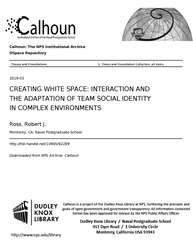File:CREATING WHITE SPACE- INTERACTION AND THE ADAPTATION OF TEAM SOCIAL IDENTITY IN COMPLEX ENVIRONMENTS (IA creatingwhitespa1094562289).pdf

Original file (1,275 × 1,650 pixels, file size: 3.25 MB, MIME type: application/pdf, 324 pages)
Captions
Captions
Summary[edit]
| CREATING WHITE SPACE: INTERACTION AND THE ADAPTATION OF TEAM SOCIAL IDENTITY IN COMPLEX ENVIRONMENTS
( |
||
|---|---|---|
| Author |
Ross, Robert J. |
|
| Title |
CREATING WHITE SPACE: INTERACTION AND THE ADAPTATION OF TEAM SOCIAL IDENTITY IN COMPLEX ENVIRONMENTS |
|
| Publisher |
Monterey, CA; Naval Postgraduate School |
|
| Description |
American military teams are increasingly embedded at the grassroots level in foreign environments to create white space. White spaces are pockets of stability within nations whose populations often suffer from instability, factionalism, civil strife, isolation, and extreme deprivation. The information warfare literature espouses soft power at the level of policy; however, it does not provide explanations for the challenges on the ground. The aim of this study is to identify the environmental conditions that impact American military team interactions while conducting village stability operations (VSO) in Afghanistan. To this end, the research question asks: What are the conditions that facilitate or hinder interaction between American teams and Afghan groups in complex cultural environments? This is a phenomenological study of the lived experience of special operators. Using a grounded theory methodology of critical incidents, this study explores the conditions that facilitate interactions with Afghan hosts and proposes a substantive theory exploring the meaning-making and social identity adaption process of American teams. American teams adapt their social identities based on the expression of intent, monitoring of cues, and interpretations of Afghan expectations before, during, and after interactions. Further research could be undertaken to operationalize the typologies, action strategies, and propositions brought forth by this research. Subjects: military strategy; soft power; information warfare; sense giving; sensemaking; information seeking; social identity; cross-cultural interaction; critical incidents technique; grounded theory construction; organizations |
|
| Language | English | |
| Publication date | March 2019 | |
| Current location |
IA Collections: navalpostgraduateschoollibrary; fedlink |
|
| Accession number |
creatingwhitespa1094562289 |
|
| Source | ||
| Permission (Reusing this file) |
This publication is a work of the U.S. Government as defined in Title 17, United States Code, Section 101. Copyright protection is not available for this work in the United States. | |
Licensing[edit]
| Public domainPublic domainfalsefalse |
This file is a work of a sailor or employee of the U.S. Navy, taken or made as part of that person's official duties. As a work of the U.S. federal government, it is in the public domain in the United States.
|
 | |
| This file has been identified as being free of known restrictions under copyright law, including all related and neighboring rights. | ||
https://creativecommons.org/publicdomain/mark/1.0/PDMCreative Commons Public Domain Mark 1.0falsefalse
File history
Click on a date/time to view the file as it appeared at that time.
| Date/Time | Thumbnail | Dimensions | User | Comment | |
|---|---|---|---|---|---|
| current | 10:09, 16 July 2020 |  | 1,275 × 1,650, 324 pages (3.25 MB) | Fæ (talk | contribs) | FEDLINK - United States Federal Collection creatingwhitespa1094562289 (User talk:Fæ/IA books#Fork8) (batch 1993-2020 #12649) |
You cannot overwrite this file.
File usage on Commons
The following page uses this file:
Metadata
This file contains additional information such as Exif metadata which may have been added by the digital camera, scanner, or software program used to create or digitize it. If the file has been modified from its original state, some details such as the timestamp may not fully reflect those of the original file. The timestamp is only as accurate as the clock in the camera, and it may be completely wrong.
| Short title | CREATING WHITE SPACE: INTERACTION AND THE ADAPTATION OF TEAM SOCIAL IDENTITY IN COMPLEX ENVIRONMENTS |
|---|---|
| Image title | |
| Author | Ross, Robert J. |
| Software used | Ross, Robert J. |
| Conversion program | Adobe PDF Library 15.0 |
| Encrypted | no |
| Page size |
|
| Version of PDF format | 1.4 |

